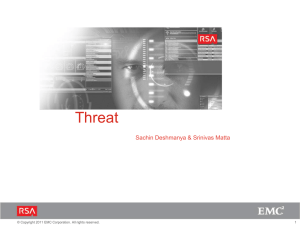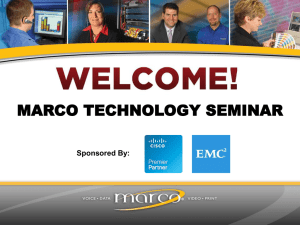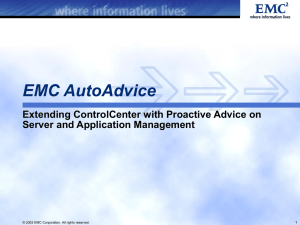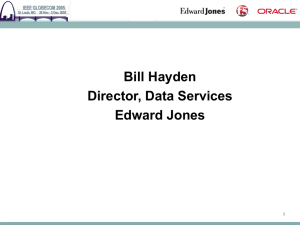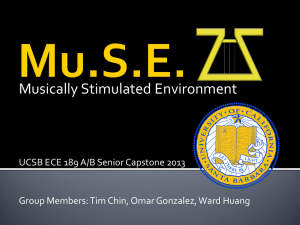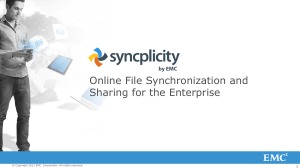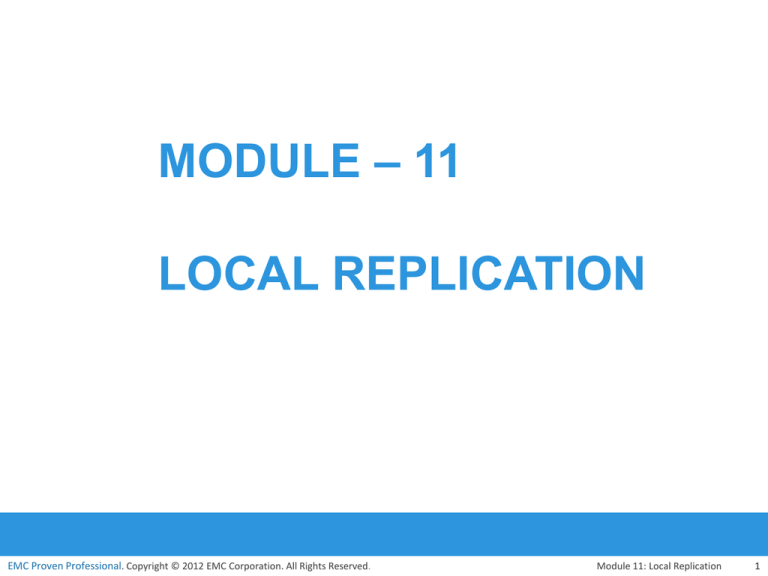
MODULE – 11
LOCAL REPLICATION
EMC Proven Professional
EMC Proven Professional. Copyright © 2012 EMC Corporation. All Rights Reserved.
Module 11: Local Replication
1
Module 11: Local Replication
Upon completion of this module, you should be able to:
• Describe various uses of local replica
• Describe how consistency is ensured in file system and database
replication
• Describe host-based, array-based, and network-based local
replication technologies
• Explain restore and restart considerations
• Describe local replication in virtualized environment
EMC Proven Professional
EMC Proven Professional. Copyright © 2012 EMC Corporation. All Rights Reserved.
Module 11: Local Replication
2
Module 11: Local Replication
Lesson 1: Local Replication Overview
During this lesson the following topics are covered:
• Uses of local replica
• File system and database consistency
EMC Proven Professional
EMC Proven Professional. Copyright © 2012 EMC Corporation. All Rights Reserved.
Module 11: Local Replication
3
What is Replication?
Replication
It is a process of creating an exact copy (replica) of data.
• Replication can be classified as
Local replication
Replicating data within the same array or data center
Remote replication
Replicating data at remote site
REPLICATION
EMC Proven Professional
Source
EMC Proven Professional. Copyright © 2012 EMC Corporation. All Rights Reserved.
Replica (Target)
Module 11: Local Replication
4
Uses of Local Replica
• Alternate source for backup
• Fast recovery
• Decision support activities
• Testing platform
• Data Migration
EMC Proven Professional
EMC Proven Professional. Copyright © 2012 EMC Corporation. All Rights Reserved.
Module 11: Local Replication
5
Replica Characteristics
• Recoverability/Restartability
Replica should be able to restore data on the source device
Restart business operation from replica
• Consistency
Replica must be consistent with the source
• Choice of replica tie back into RPO
Point-in-Time (PIT)
Non-zero RPO
Continuous
Near-zero RPO
EMC Proven Professional
EMC Proven Professional. Copyright © 2012 EMC Corporation. All Rights Reserved.
Module 11: Local Replication
6
Understanding Consistency
• Consistency ensures the usability of replica
• Consistency can be achieved in various ways for file system and
database
File System
Database
Offline
Online
Unmount file system
Flushing host buffers
Shutdown database
a) Using dependent write I/O
principle
b) Holding I/Os to source before
creating replica
EMC Proven Professional
EMC Proven Professional. Copyright © 2012 EMC Corporation. All Rights Reserved.
Module 11: Local Replication
7
File System Consistency: Flushing Host Buffer
Application
File System
Flush Buffer
Data
Memory Buffers
Logical Volume Manager
Physical Disk Driver
EMC Proven Professional
Source
EMC Proven Professional. Copyright © 2012 EMC Corporation. All Rights Reserved.
Replica
Module 11: Local Replication
8
Database Consistency: Dependent Write I/O
Principle
Source
Replica
Source
Replica
1
1
1
2
2
2
3
3
3
3
4
4
4
4
CC
EMC Proven Professional
Consistent
EMC Proven Professional. Copyright © 2012 EMC Corporation. All Rights Reserved.
D
Inconsistent
Module 11: Local Replication
9
Module 11: Local Replication
Lesson 2: Local Replication Technologies
During this lesson the following topics are covered:
• Local replication technologies
• Restore and restart considerations
EMC Proven Professional
EMC Proven Professional. Copyright © 2012 EMC Corporation. All Rights Reserved.
Module 11: Local Replication
10
Host-based Replication: LVM-based Mirroring
Logical Volume
Physical
Volume 1
Physical
Volume 2
Host
EMC Proven Professional
EMC Proven Professional. Copyright © 2012 EMC Corporation. All Rights Reserved.
Module 11: Local Replication
11
Host-based Replication: File System Snapshot
• Pointer-based replication
• Uses Copy on First Write
(CoFW) principle
• Uses bitmap and block map
• Requires a fraction of the
space used by the
production FS
FS Snapshot
Metadata
Production FS
Bit
BLK
Metadata
1-0
1-0
2-0
2-0
1 Data a
3-1
3-2
2 Data b
4-1
4-1
3 Data C
4 Data D
1 Data d
2 Data c
3 no data
EMC Proven Professional
EMC Proven Professional. Copyright © 2012 EMC Corporation. All Rights Reserved.
N Data N
4 no data
Module 11: Local Replication
12
Storage Array-based Local Replication
• Replication performed by the array operating environment
• Source and replica are on the same array
• Types of array-based replication
Full-volume mirroring
Pointer-based full-volume replication
Pointer-based virtual replication
Source
EMC Proven Professional
Production Host
EMC Proven Professional. Copyright © 2012 EMC Corporation. All Rights Reserved.
Replica
Storage Array
BC Host
Module 11: Local Replication
13
Full-Volume Mirroring
Attached
Read/Write
Not Ready
Source
Production Host
Target
BC Host
Storage Array
Detached - PIT
Read/Write
Read/Write
Source
Production Host
EMC Proven Professional
Target
Storage Array
EMC Proven Professional. Copyright © 2012 EMC Corporation. All Rights Reserved.
BC Host
Module 11: Local Replication
14
Pointer-based Full-Volume Replication
• Provides full copy of source data on the target
• Target device is immediately accessible by the BC host after the
replication session is activated
• PIT is determined by time of session activation
• Target device is at least as large as the source device
• Two modes
Full copy mode
After session starts, all the data from source is copied to the target in
the background
Copy on First Access (deferred)
EMC Proven Professional
EMC Proven Professional. Copyright © 2012 EMC Corporation. All Rights Reserved.
Module 11: Local Replication
15
Copy on First Access: Write to the Source
Write to
Source
C’
A
C
B
C’
C
Source
Target
Production Host
BC Host
• When a write is issued to the source for the first time after replication
session activation:
Original data at that address is copied to the target
Then the new data is updated on the source
This ensures that original data at the point-in-time of activation is
EMC Proven Professional
preserved on the target
EMC Proven Professional. Copyright © 2012 EMC Corporation. All Rights Reserved.
Module 11: Local Replication
16
Copy on First Access: Write to the Target
Write to
Target
A
B’
B
B
B’
C’
C
Source
Target
Production Host
BC Host
• When a write is issued to the target for the first time after replication
session activation:
The original data is copied from the source to the target
Then the new data is updated on the target
EMC Proven Professional
EMC Proven Professional. Copyright © 2012 EMC Corporation. All Rights Reserved.
Module 11: Local Replication
17
Copy on First Access: Read from Target
Read
request for
data “A”
A
A
A
B
B’
C’
C
Source
Target
Production Host
A
BC Host
• When a read is issued to the target for the first time after replication
session activation:
The original data is copied from the source to the target and is made
available to the BC host
EMC Proven Professional
EMC Proven Professional. Copyright © 2012 EMC Corporation. All Rights Reserved.
Module 11: Local Replication
18
Pointer-based Virtual Replication
• Targets do not hold data, but hold pointers to where the data is
located
At the start of the session the target device holds pointers to data
on source device
Target requires a small fraction of the size of the source volumes
• Target devices are accessible immediately when the session is
started
• Uses CoFW principle
• This method is recommended, if the changes to the source are
typically less than 30%
EMC Proven Professional
EMC Proven Professional. Copyright © 2012 EMC Corporation. All Rights Reserved.
Module 11: Local Replication
19
Pointer-based Virtual Replication (CoFW): Write to
Source
Save Location
Source
Target
Virtual Device
A
C’
Write to Source
B
C
C’
C
• When a write is issued to the source for the first time after replication
session activation:
Original data at that address is copied to save location
The pointer in the target is updated to point to this data in the save
location
EMC Proven
Professional
Finally, the new write is updated on the source
EMC Proven Professional. Copyright © 2012 EMC Corporation. All Rights Reserved.
Module 11: Local Replication
20
Pointer-based Virtual Replication (CoFW): Write to
Target
A’
Write to Target
Save Location
Source
Target
Virtual Device
A
B
A
C’
A’
A
C
• When a write is issued to the target for the first time after replication
session activation:
Original data from the source device is copied to the save location
The pointer is updated to the data in save location
Another
copy
EMC
Proven
Professional
of the original data is created in the save location before
the new write is updated on the save location
EMC Proven Professional. Copyright © 2012 EMC Corporation. All Rights Reserved.
Module 11: Local Replication
21
Tracking Changes to Source and Target
Source
0
0
0
0
0
0
0
0
Target
0
0
0
0
0
0
0
0
Source
1
0
0
1
0
1
0
0
Target
0
0
1
1
0
0
0
1
At PIT
After PIT…
For resynchronization/restore
Logical OR
EMC Proven Professional
1
0
0
1
1
unchanged
EMC Proven Professional. Copyright © 2012 EMC Corporation. All Rights Reserved.
0
1
1
0
1
changed
Module 11: Local Replication
22
Restore and Restart Considerations
• Source has a failure
Logical corruption or physical failure of source devices
• Solution
Restore data from target to source
Restore would typically be done incrementally
Applications can be restarted even before synchronization is
complete
-----OR----- Start production on target
Create a “Gold” copy of target device before restarting on target
Resolve issues with source while continuing operations on target
After resolving the issue, restore latest data on target to source
EMC Proven Professional
EMC Proven Professional. Copyright © 2012 EMC Corporation. All Rights Reserved.
Module 11: Local Replication
23
Comparison of Local Replication Technologies
Full-Volume
Mirroring
Pointer-based FullVolume Replication
Pointerbased
Virtual
Replication
Performance
impact on
source due to
replica
No impact
Full copy mode – no
impact
CoFA mode – some
impact
High impact
Size of target
At least the
same as the
source
At least the same as the
source
Small fraction
of the source
Not required
Full copy mode – not
required
CoFA mode – required
Required
Only after
synchronization
and detachment
from the source
Immediately accessible
Immediately
accessible
Factor
Availability of
source for
restoration
EMC Proven Professional
Accessibility to
target
EMC Proven Professional. Copyright © 2012 EMC Corporation. All Rights Reserved.
Module 11: Local Replication
24
Network-based Local Replication: Continuous Data
Protection
• Replication occurs at the network layer between the hosts and
storage arrays
Ideal for highly heterogeneous environment
• Typically provides the ability to restore data to any previous
point-in-time
RPOs are random and do not need to be defined in advance
• Data changes are continuously captured and stored in a separate
•
location from the production data
CDP is implemented by using
Journal volume
CDP appliance
EMC
Proven
Professional
Write
splitter
EMC Proven Professional. Copyright © 2012 EMC Corporation. All Rights Reserved.
Module 11: Local Replication
25
CDP Local Replication Operation
Host
Write
Splitter
SAN
CDP Appliance
Storage Array
EMC Proven Professional
Production
Volume
Replica
EMC Proven Professional. Copyright © 2012 EMC Corporation. All Rights Reserved.
CDP Journal
Module 11: Local Replication
26
Module 11: Local Replication
Lesson 3: Local Replication in Virtualized Environment
During this lesson the following topics are covered:
• Mirroring of a virtual volume
• Replication of virtual machines
EMC Proven Professional
EMC Proven Professional. Copyright © 2012 EMC Corporation. All Rights Reserved.
Module 11: Local Replication
27
Local Replication in Virtualized Environment
• Local replication (mirroring) of a virtual volume assigned to a
host
Mirroring is performed by a virtualization appliance
• Replication of virtual machines
VM snapshot
VM clone
EMC Proven Professional
EMC Proven Professional. Copyright © 2012 EMC Corporation. All Rights Reserved.
Module 11: Local Replication
28
Local Replication of Virtual Volume
Data Center
Host
I/Os
Mirrored
Virtual Volume
Virtualization
Appliance
Storage
Pool
SAN
LUN
LUN
EMC Proven Professional
Storage Array
EMC Proven Professional. Copyright © 2012 EMC Corporation. All Rights Reserved.
Mirror
Legs
Storage Array
Module 11: Local Replication
29
VM Snapshot
• Captures the state and data of a running VM at a specific PIT
• Uses a separate delta file to record all the changes to the virtual
disk since the snapshot session is activated
• Restores all settings configured in a guest OS to the PIT
EMC Proven Professional
EMC Proven Professional. Copyright © 2012 EMC Corporation. All Rights Reserved.
Module 11: Local Replication
30
VM Clone
• An identical copy of an existing VM
Clones are created for different use such as testing
Changes made to a clone VM do not affect the parent VM and vice
versa
• Clone VM is assigned a separate network identity
Clone has its own separate MAC address
• Useful when multiple identical VMs need to deploy
EMC Proven Professional
EMC Proven Professional. Copyright © 2012 EMC Corporation. All Rights Reserved.
Module 11: Local Replication
31
Module 11: Local Replication
Concept in Practice
• EMC SnapView
• EMC TimeFinder
• EMC RecoverPoint
EMC Proven Professional
EMC Proven Professional. Copyright © 2012 EMC Corporation. All Rights Reserved.
Module 11: Local Replication
32
EMC SnapView
• SnapView Snapshot
Logical view of the production volume
Full image
copy
Uses CoFW principle
• SnapView Clone
Full volume copies that require same disk
space as the source
Becomes a PIT copy once the clone is
fractured from the source
Clone
Clone
Source
LUN
Snap
Snap
EMC Proven Professional
EMC Proven Professional. Copyright © 2012 EMC Corporation. All Rights Reserved.
Logical pointin-time view
Module 11: Local Replication
33
EMC TimeFinder
• TimeFinder/Snap
Creates space-saving, logical PIT (snapshots)
Allows creating multiple snapshots from a single source
• TimeFinder/Clone
Creates PIT copy of the source volume
Uses pointer-based full-volume replication technology
Allows creating multiple clones from a single source device
EMC Proven Professional
EMC Proven Professional. Copyright © 2012 EMC Corporation. All Rights Reserved.
Module 11: Local Replication
34
EMC RecoverPoint
• Provides continuous data protection and recovery to any PIT
• Uses splitting technology at server, fabric, or array to mirror a
write to a RecoverPoint appliance
• Provides automatic RecoverPoint appliance failover
• Family of product includes
RecoverPoint/CL
RecoverPoint/EX
RecoverPoint/SE
EMC Proven Professional
EMC Proven Professional. Copyright © 2012 EMC Corporation. All Rights Reserved.
Module 11: Local Replication
35
Module 11: Summary
Key points covered in this module:
• Uses of local replicas
• Consistency in file system and database replication
• Host-based, storage array-based, and network-based replication
• Restore and restart considerations
• Local replication of a virtual volume
• VM snapshot and VM clone
EMC Proven Professional
EMC Proven Professional. Copyright © 2012 EMC Corporation. All Rights Reserved.
Module 11: Local Replication
36
Exercise: Local Replication
• Scenario
Organization’s mission critical data is stored on RAID 1 volumes
Database application uses 1TB storage
Average data that changes in 24 hours is 60 GB
• Requirements
Need solution to address logical corruption of database
Maximum RPO of 1 hour
Solution should support restore request for up to 8 hours old data
Minimize the amount of storage used for data protection
• Task
Suggest an appropriate local replication solution to meet RPO
requirement with minimum amount of storage
EMC
Proven
Professionalthe physical storage required by this solution
Estimate
EMC Proven Professional. Copyright © 2012 EMC Corporation. All Rights Reserved.
Module 11: Local Replication
37

